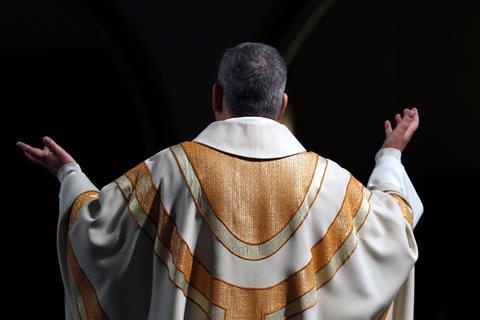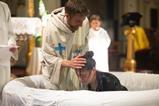Should our prayers be set, or spontaneous? Tony Wilson suggests that liturgy should be used as a springboard for our own personal prayers. He explains why

Discussing the relative merits of spontaneous and liturgical prayer with an evangelical friend, we reached a point of disagreement. She argued, with good reason, that prayers expressed in our own words come from the heart and more sincerely reflect our authentic thoughts and feelings.
I’m not convinced.
Our post-modern culture has taught us to value self expression. Couple this with the power of mobile technology, and the result is that we are more likely to create content than consume what other people have created. Our social networks put us in transmit mode rather than incline us to listen attentively to what is being said. Instead of judiciously weighing different points of view, we tend to surround ourselves with people who express ideas we already agree with.
This group-think is prevalent at prayer meetings in churches too. When a group of Christians meet for a time of spontaneous prayer, we can easily find ourselves searching to pray for something that will meet the approval of everyone else in the room. We tend to express our prayerful desires in ways that cohere doctrinally with those around us rather than throw something challenging into the mix.
Can we trust our hearts?
It’s also a little naïve to think we are as psychologically simple as my friend suggests. Where exactly do I find my authentic self from which my heartfelt prayers are supposed to emerge? There is certainly an upper layer, close to the surface of my mind and soul, which can shift around quite easily. I can slip into that mindset like pulling on an old comfortable pair of jeans. No effort required.
Where exactly do I find my authentic self from which my heartfelt prayers are supposed to emerge?
We all have a deeper element that lies more hidden, even from ourselves. It is the part of our minds and souls where our subconscious lies. By definition, this is the part of me which lies below my conscious awareness and it is much more powerful than we give it credit. It is the place from which my instant reactions and gut instincts come. It is the driver of much of what I end up doing and saying, for good or ill.
The Bible has strong words to say about the deceitfulness of the heart and this is perhaps no more clearly expressed than in Jeremiah 17:9: “The heart is deceitful above all things and beyond cure. Who can understand it?” How often I have ended up doing something that is contrary to my ultimate wellbeing or destructive to those around me because I’ve justified the means to a particular end with all kinds of seemingly good intentions.
Most of us, if we are honest, are quite capable of expressing good thoughts and words at a superficial level. We have even taught ourselves to behave in a civil way most of the time. But the mask can slip when we’re subjected to the wrong kinds of triggers and circumstances. While we’re still being sanctified by God, we must take Paul’s advice to take every thought captive (2 Corinthians 10:5) until we can trust ourselves to spontaneously think, act and even pray correctly.
What did the first Christians do?
Daily liturgical worship had been established in the Jewish Temple since the time of David with psalms prayed and sung on a regular cycle. The first Christians, including Peter and John (Acts 3:1), continued to take part in temple worship so the singing of psalms naturally featured in earliest forms of Christian worship (Ephesians 5:19, Colossians 3:16).
The Didache was the first handbook on how to lead a church. With initial drafts plausibly in circulation as early as the year 49, it describes the liturgical life of the Church and how to induct new believers. In turn, The Liturgy of the Hours, still practised today by many denominations, became the regular cycle of prayer in early Christian monastic communities.
God uses prayer to form us
Praying directly from scripture verses that I have not chosen, creates a strong point of reference for me. It is surely true that I can pray it in a mindless, rote kind of way that is of no practical benefit. But, at its best, it stands as a polar opposite to generating my own words from my own deceitful heart.
God invites me to align my heart with the words on the page and the Holy Spirit makes me aware of the reality gap between the psalm and where my heart currently sits. If I struggle to praise God as the words invite me, it offers me a moment of reflection as to why this might be. I need to pray to understand why the psalmist’s words are causing me discomfort. I gain some insight into the healing that my heart needs to align myself with the truth I am praying. I often pray: “Lord, help me to make these words my own.”
Most days, the words remind me of a situation of a friend or a global issue and create a momentary diversion to lift them up to God. The scriptures are always a springboard to personal adoration, thanksgiving and petition on behalf of others. So, far from replacing spontaneous communication with God, liturgy is the runway from which my personal prayers take off.
Liturgy is the runway from which my personal prayers take off
Liturgical prayer is the companion along the road of sanctification. It doesn’t provide any quick fix; it isn’t the spiritual equivalent of a miracle weight-loss drug. But, over months and years, the daily prayerful encounter with biblical truth provides a template through which my life is reformed around the person of Christ.







































No comments yet